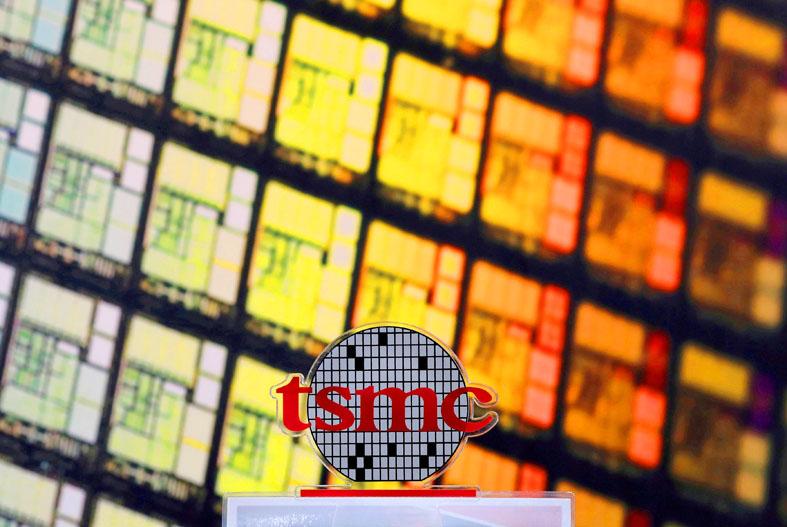Samsung Electronics Co is considering a second location in Texas for its planned US$17 billion US semiconductor plant, a signature project that could address US concerns about chip security while expanding its own capabilities.
The South Korean company is exploring another 6 million square feet (557,418m2) site apart from a previously disclosed expansion of its Austin base, according to documents filed with the local government. If it goes ahead, Samsung would begin construction at the Williamson Country site in the first quarter of next year, with production expected to commence in the final quarter of 2024.
Samsung is weighing options for an advanced chipmaking plant in the US, in hopes of winning more US clients and narrowing the gap with industry leader Taiwan Semiconductor Manufacturing Co (TSMC, 台積電).

Photo: Reuters
The company had been in discussions to build a facility in Austin, Texas, capable of fabricating chips as advanced as 3 nanometers, people familiar with the matter have said.
Dubbed Project Silicon Silver, that plan included adding about 650,000m2 of new space to the Austin campus, where the company has had operations for decades. It called for investment of about US$17 billion and the creation of about 1,800 jobs over the first 10 years, according to an economic impact study prepared by a local consultant. Those objectives were echoed in the filing made public on Thursday for Williamson County, which is just north of Austin.
In a January filing, the company detailed a timeline for the Austin project that spanned breaking ground in the second quarter of this year, with production up and running by the fourth quarter of 2023.
It is also evaluating alternative sites in Arizona and New York, as well as in South Korea.
Samsung is taking advantage of a concerted US government effort to counter China’s rising economic prowess and lure back home some of the advanced manufacturing that over the past decades has gravitated toward Asia.
US President Joe Biden last month laid out a sweeping effort to secure the nation’s critical supply chains, including a proposed US$52 billion to bolster domestic chip manufacturing.
The hope is that such production bases in the US would galvanize local businesses and support US industry and chip design. Intel Corp’s troubles ramping up on technology and its potential reliance in the future on TSMC and Samsung for at least some of its chipmaking only underscored the extent to which Asian giants have forged ahead in recent years.
If Samsung goes ahead, it would effectively go head-to-head on US soil with TSMC, which is on track to build its own US$12 billion chip fab in Arizona by 2024.
Samsung is trying to catch TSMC in the so-called foundry business of making chips for the world’s corporations — a particularly pivotal capability given a deepening shortage of semiconductors.
Under Samsung family scion Jay Y. Lee, the company has said it wants to be the biggest player in the US$400 billion chip industry. It plans to invest US$151 billion through 2030 into its foundry and chip design businesses, aiming to catch TSMC by offering chips using 3-nanometer process technology next year.

South Korea’s equity benchmark yesterday crossed a new milestone just a month after surpassing the once-unthinkable 5,000 mark as surging global memory demand powers the country’s biggest chipmakers. The KOSPI advanced as much as 2.6 percent to a record 6,123, with Samsung Electronics Co and SK Hynix Inc each gaining more than 2 percent. With the benchmark now up 45 percent this year, South Korea’s stock market capitalization has also moved past France’s, following last month’s overtaking of Germany’s. Long overlooked by foreign funds, despite being undervalued, South Korean stocks have now emerged as clear winners in the global market. The so-called “artificial intelligence

‘SEISMIC SHIFT’: The researcher forecast there would be about 1.1 billion mobile shipments this year, down from 1.26 billion the prior year and erasing years of gains The global smartphone market is expected to contract 12.9 percent this year due to the unprecedented memorychip shortage, marking “a crisis like no other,” researcher International Data Corp (IDC) said. The new forecast, a dramatic revision down from earlier estimates, gives the latest accounting of the ongoing memory crunch that is affecting every corner of the electronics industry. The demand for advanced memory to power artificial intelligence (AI) tasks has drained global supply until well into next year and jeopardizes the business model of many smartphone makers. IDC forecast about 1.1 billion mobile shipments this year, down from 1.26 billion the prior

People stand in a Pokemon store in Tokyo on Thursday. One of the world highest-grossing franchises is celebrated its 30th anniversary yesterday.

NEW IDENTITY: Known for its software, India has expanded into hardware, with its semiconductor industry growing from US$38bn in 2023 to US$45bn to US$50bn India on Saturday inaugurated its first semiconductor assembly and test facility, a milestone in the government’s push to reduce dependence on foreign chipmakers and stake a claim in a sector dominated by China. Indian Prime Minister Narendra Modi opened US firm Micron Technology Inc’s semiconductor assembly, test and packaging unit in his home state of Gujarat, hailing the “dawn of a new era” for India’s technology ambitions. “When young Indians look back in the future, they will see this decade as the turning point in our tech future,” Modi told the event, which was broadcast on his YouTube channel. The plant would convert